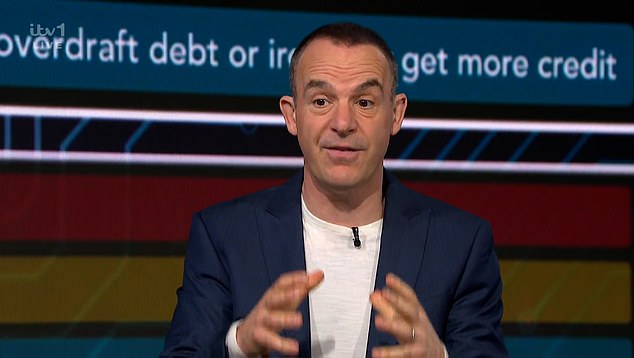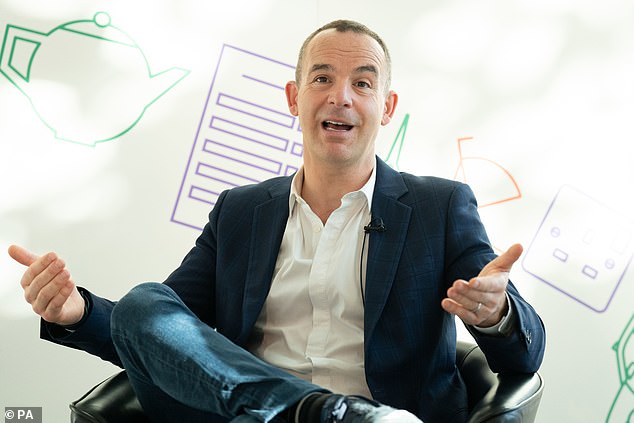- Money saving expert introduced 'the holy trinity' of a good credit score
- READ MORE: Martin Lewis reveals how you could save hundreds of pounds on broadband every year as he urges customers to act ahead of Black Friday
Martin Lewis stumped his live audience by revealing that credit scores don't actually exist - while unveiling the 'holy trinity' of measures that lenders are actually using to assess your eligibility.
The British money saving expert, 52, dedicated Tuesday's episode of his live ITV show to talk about all things credit score.
Kicking off the hour-long programme, audience member Suzanne asked Martin: What is the most important factor in determining your credit score?'
But before he answered the question, Martin issued an unexpected disclaimer that shocked viewers.
'You don't have a credit score,' he said. 'You don't have one.'
'There is no single number that dictates if a lender will accept you. Each individual lender scores you differently based on its own wish list of what is a profitable customer.
'The credit reference agencies market a credit scoring tool but it is just their idea, a rough example, of how a typical lender may look at you. It isn't rock solid, it isn't official.'
Martin added that people have become 'overly trapped' in the confines of their credit score when, in reality, just 'one factor' determines an acceptance decision.

Martin Lewis dedicated Tuesday's episode of his ITV show to the credit score
His advice? 'Do not sweat small changes in your credit score - it is just an indicator, it isn't real.'
With that out of the way, Martin said that your credit file, also known as a credit report, 'really does matter' and insisted that people go through this 'line by line' annually.
He said: 'Even small errors can lead to rejection.
'I'm talking about an old mobile phone contract that is closed but it is linked to the wrong address - that could cost you a mortgage deal.'
Before any large application, Martin recommends getting your credit file from all three credit reference agencies: Equifax, Experian and Transunion.
The 52-year-old presenter then laid out the three measures that lenders are looking for in their customers - or what he calls 'the holy trinity'.
The first being debt ratio aka what percentage of unsecured debt you have compared to annual income.
Offering an example, Martin said: 'Say you've only got a £10,000 credit card, you earn £40,000 - that is a 25 per cent debt ratio. Lower is better.'

The British money saving expert told the live audience that the credit score 'isn't real'

During his hour-long ITV show, Martin reveals the 'holy trinity' of measures lenders actually use to assess your eligibility: debt ratio, credit utilisation and disposable income
But how do you improve it?
'Well, you can reduce your debt - pay some of it off if you can - or you could improve your income,' he explained.
Martin revealed that a debt ratio below 20 per cent is considered 'excellent', 20-40 per cent is 'good', 40-60 per cent is 'okay' and over 60 per cent is 'bad'.
But, he continued, 'lenders do like some debt. They like to see that you're using it and they like some data on you.
'So if you have a debt ratio of under one percent, that can actually be negative, especially if you have very few debt products.
'One way round this is you get yourself a cashback credit card that you are spending every month but you're paying off in full.'
The second measure that lenders rely on is credit utilisation or the percentage of available credit used.
'Imagine you've got £100 debt and you've got a £1,000 credit limit - that's a 10 per cent credit utilisation.
'How do you boost this? Well, you reduce your card overdraft debt or ironically you could get more credit and not use it and that way you would have a lower credit utilisation.

Martin Lewis is a financial journalist who offers advice on his ITV show as well as his website Money Saving Expert
Much like the debt ratio, a credit utilisation score below 20 per cent is considered 'excellent', 20-40 per cent is 'good', 40-60 per cent is 'okay' and over 60 per cent is 'bad'.
However Martin added: 'High credit utilisation and low debt ratio isn't a big deal.
'But high credit utilisation, using 90 per cent of your available credit, and you've got a big debt ratio, that's when it is really a problem.'
The final measure is disposable income or the spare cash each month after bills and essentials, according to the money saving expert.
Unlike debt ratio and credit utilisation, when it comes to disposable income Martin said: 'Higher is better.'
Turning back to Suzanne, Martin concluded that debt ratio, credit utilisation and disposable income are the 'big three' factors in determining your credit score.































































































































































































































































